Over the years–especially the last few years–we have had stories come up that work better as Twitter threads than as full BHR posts. As much as I would prefer to keep all the good stuff on this website, some stories just lend themselves to Twitter’s brand of short-attention-span theater. That’s why I’ve mentioned the BHR Twitter account on here more than once as something you should be following.
If you were following our Twitter account yesterday, for instance, you might have seen this thread about the contract between the City of Little Rock and Think Rubix for production of the upcoming Fyre Fest Redux LITfest.
That whole thread is worth a read if you haven’t already seen it, because it is a broad overview of some of the question marks surrounding this whole doomed event.
The more I thought about it, though, the more I realized that this deserved a full post. Because, friends, the entire contracting process, as well as the contract itself, are…odd? No. That’s not strong enough. Let’s go with “laughably bad.”
First some context.
According to the records provided so far, as well as public statements made by the key players, the City of Little Rock put out a request for qualifications (“RFQ”) on January 20, 2022. (You can read the entire RFQ here.) Interested companies who wished to be considered to produce LITfest had to respond to the city’s RFQ by no later than 3pm on February 9, 2022. Which is to say, the city, who did not have a specific date set for the festival and was not under any kind of time crunch, allowed a whopping 15 business days for interested companies to put together an application. We’ll call that red flag #1.
On January 26, Mayor Frank Scott announced that Charles Blake had resigned from his position as Chief of Staff effective January 31. Which is odd, mainly because Blake’s letter of resignation (as provided by the city) says that Blake tendered his resignation on January 28:

But, hey, nothing sketchy about a mayor announcing the resignation of his chief of staff two days before the guy tenders his resignation, right? Nothing odd about a chief of staff announcing on Friday that he’s resigning effective Monday, either, right? I mean, that form letter with incorrect syntax and grammar certainly doesn’t look cobbled together at the last minute, does it?
ANYWAY…Blake appears to have begun working for Think Rubix on February 1, 2022. On February 9, right before the deadline for responses to the city’s RFQ, Think Rubix submitted their proposal. According to the city, Think Rubix was the only company to submit a bid.
On February 10, Casey Hook, Senior Buyer for the City of Little Rock, sent the following email to the evaluation committee, asking them to score Think Rubix’s RFQ submission:
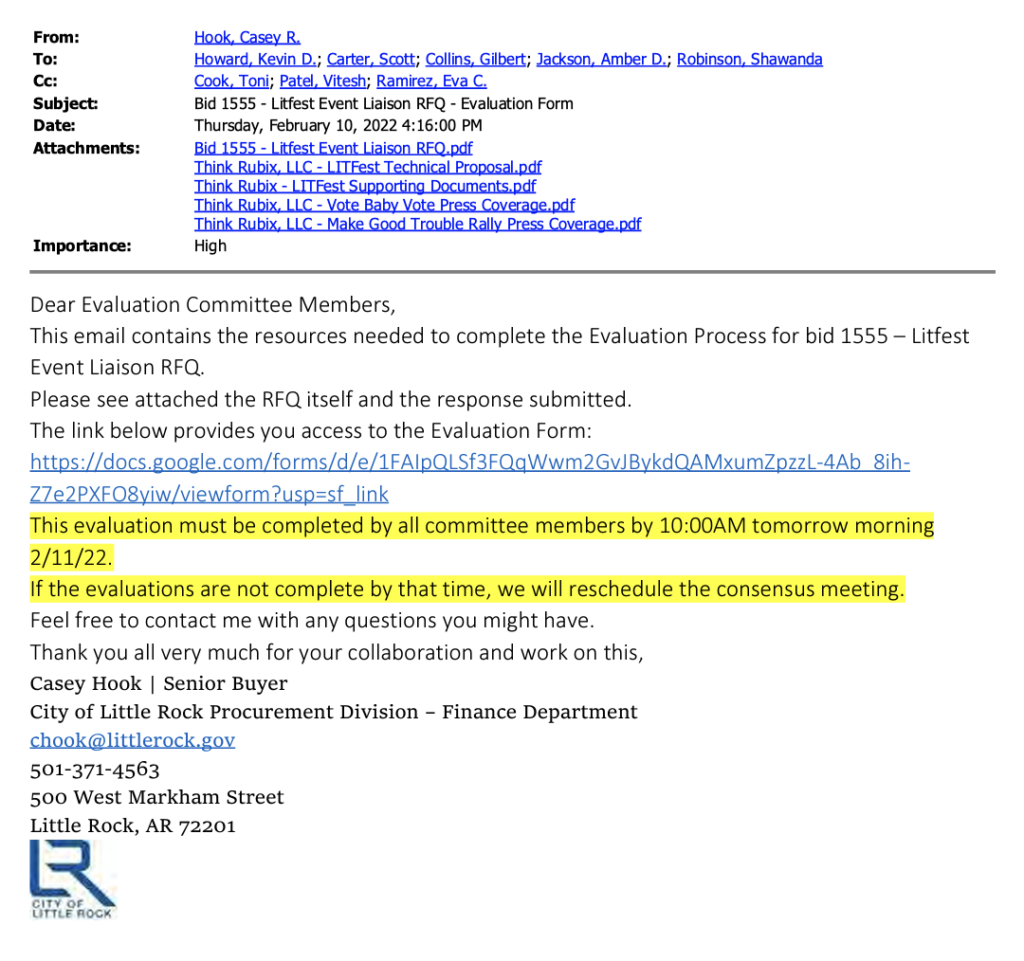
That email was sent at 4:16PM on February 10, and the Evaluation Committee was told that they needed to score Think Rubix’s response to the RFQ by 10AM the following day. That is a total of 2.75 work hours, announced at the last minute, in which every committee member was supposed to read, evaluate, and score the response. That doesn’t leave much time for due diligence, I guess. Call this red flag #2.
The city selected Think Rubix as the winner on February 17, and they asserted that Charles Blake had no role in Think Rubix’s bid or the selection of Think Rubix as the winner. However, despite everything about Blake’s hiring by Think Rubix allegedly being on the up and up, neither Think Rubix nor the city announced that Blake had joined the private firm until April 7. Additionally, despite everything about awarding the contract to Think Rubix theoretically being on the up and up, the city did not announce the selection of Think Rubix until April 14, 2022. We can call this red flag #3.
On February 25, the city contacted Think Rubix to ask them to submit an updated W-9 so that the city could get started on the contract drafting, and Think Rubix provided the updated form on that date. And it is right about here that the wheels on this whole clusterbus start to wobble.
On March 11, having not heard anything from the city, Think Rubix emailed again, saying “let us know if you have any additional questions or needs.” The city did not respond to this email. So, on March 15 they emailed again, asking when they could expect to hear something about the contract.
The following day, Kendra Pruitt, Charles Blake’s replacement as Chief of Staff for the mayor, responded that the city had “a draft contract and separate memo” that they would get to Think Rubix that week. By March 21, following a few additional email exchanges, Think Rubix wrote, “We’ll provide feedback soon and look forward to the finalized contract.”
What would become the final contract was signed by Tristan Wilkerson on May 14, 2022. (You can read the contract here.) For whatever reason, however, the contract was not signed by City Manager Bruce Moore until June 9, 2022, which was also the date that City Attorney Tom Carpenter’s office signed off on the agreement.
With that background out of the way, let’s dive into the contract itself.

See that first red box near the top, where it says that Think Rubix, LLC is “a limited liability company duly organized pursuant to the laws of the state of Arkansas”? This is what you might call “a lie.” At the very least, it’s proof that no due diligence was done on this contract.
You see, Think Rubix is not an Arkansas LLC. It does not show up on the Secretary of State’s website as either an Arkansas LLC or a fictitious name for a different Arkansas LLC. Red flag #4.
Now it could be that Think Rubix is an LLC formed in a different state. That’s feasible. But, if that is the case, then (a) this statement in the contract is still false on its face and (b) Think Rubix has failed to register with the Arkansas Secretary of State as a foreign entity doing business in Arkansas. While that failure to register would not impair the validity of the contract under Ark. Code Ann. 4-32-107, it would open this can of worms:
(d) A foreign limited liability company which transacts business in this state without registration shall be liable to the state for the years or parts thereof during which it transacted business in this state without registration in an amount equal to all fees which would have been imposed by this chapter upon that foreign limited liability company had it duly registered and all penalties imposed by this chapter. The Attorney General may bring proceedings to recover all amounts due this state under the provisions of this section.
(e) A foreign limited liability company which transacts business in this state without registration shall be subject to a civil penalty, payable to the state, not to exceed five thousand dollars ($5,000) for each twelve-month period or part thereof, beginning with the date it began transacting business in this state and ending on the date it becomes registered.
(f) The civil penalty set forth in subsection (e) of this section may be recovered in an action brought within a court by the Attorney General. Upon a finding by the court that a foreign limited liability company has transacted business in this state in violation of this chapter, the court shall issue, in addition to the imposition of a civil penalty, an injunction restraining further transactions of the business of the foreign limited liability company and the further exercise of any limited liability company’s rights and privileges in this state. The foreign limited liability company shall be enjoined from transacting business in this state until all civil penalties plus any interest and court costs which the court may assess have been paid and until the foreign limited liability company has otherwise complied with the provisions of this subchapter.
Guys, is it a good sign for your contracting process if the best case scenario is that a complete lack of verification of qualifications on your end resulted in a contract with a company that could be sued and enjoined from further work in the state until they comply with state law? Because it doesn’t feel like a great sign.
It gets worse, though. Remember the city’s RFQ that they sent out in January? Well, right there in the RFQ is this gem:

At the time that they submitted the response to the RFQ, and continuing to this day as far as I can tell, Think Rubix was not “licensed to do business in the State of Arkansas by any applicable government authority,” because they had not either created an LLC in Arkansas or registered a foreign LLC to do business in the state of Arkansas. If you are going to take the time to bold the word “must” in that requirement, maybe that is also something that you should verify when someone responds?
Of course, the fact that Think Rubix was not licensed to do business in Arkansas at the time of this contract is why I also marked the contract language about Think Rubix’s being “the most qualified respondent.” First off, they were the only respondent. Second, and much more importantly, they were not qualified by the terms of the city’s own RFQ! Do you realize what an insane stretch it is to say that a company that did not meet the qualifications you set out was the “most qualified” simply because they were the only respondent?
Finally, as far as the first page goes, just keep that part about “an amount not to exceed $45,000” in the back of your head for now. We’ll come back to it on page 2.

Last things first, that is some interesting sleight of hand, going from “an amount not to exceed $45,000” to “here is how we are going to pay you exactly $45,000” in the same paragraph. Maybe it’s just me, but “an amount not to exceed X” appears to mean that the city is willing to pay up to $45,000, but would expect to pay less if the cost was less or if the work was not fully completed. Whereas a schedule of when three $15,000 checks would be paid suggests that the payment is going to be exactly $45,000, not just an amount that doesn’t exceed $45,000. Let’s call that one red flag #5.
Hmm. Ok. Well, maybe once we look at Exhibit B, which is referenced in the first red box on page 2 above, it will make more sense. If we can see that Think Rubix has been hitting all of these deadlines and measurables from the start, then perhaps the flat $45,000 will make sense.

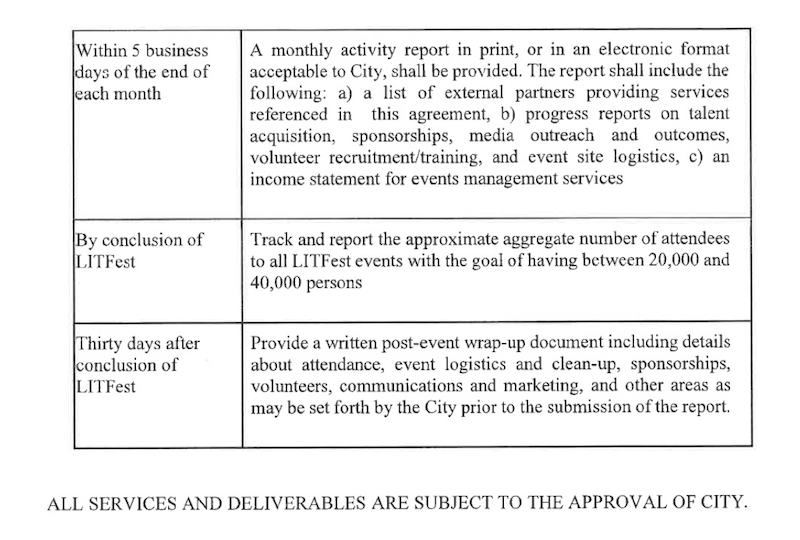
Oooh. That’s less than ideal. As we sit here today, based on AFOIA responses from the city so far, it does not appear that Think Rubix provided the required reports on June 6, July 5, or the two relevant days in August and September. It also does not appear that they completed the July 15 report, which was “a written days-of-event timeline, production schedule, and run-of-show.” But at least they got a web domain on May 26 and have done almost nothing with it!
Still, if Think Rubix really has not provided the required reports, they are in breach of the contract. Of course, the city arguably is as well, since page 2 of the contract required that the city pay the first $15,000 within thirty days of the agreement, which would have been July 9, but did not actually make that payment until September 12. Solid effort all around. Red flag #6.
Let’s move on.
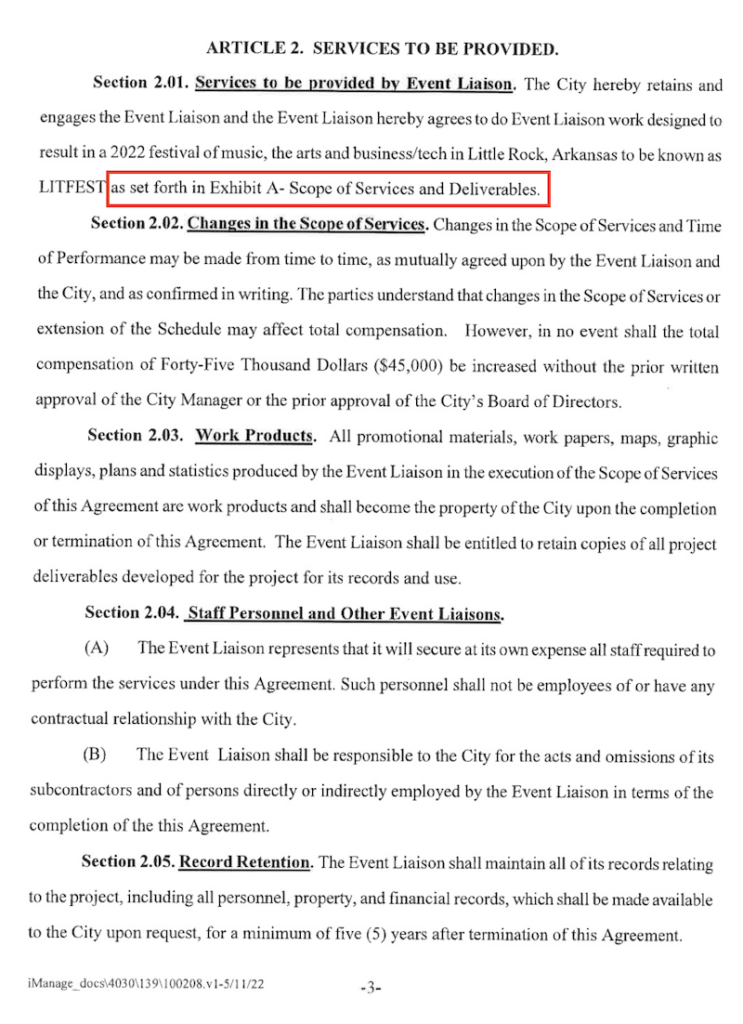
I included this page solely because, with that little reference to Exhibit A, “Scope of Service and Deliverables,” this whole thing manages to get dumber. If we go to Exhibit A, right at this top, we see this:

The inclusion of this language about “key performance indicators” makes sense on its face, as section 3.5 of the city’s original RFQ states:

The RFQ and the contract both make clear that “key performance indicators” are important and are how Think Rubix’s progress will be measured, so you might expect that the contract would actually define these somewhere within its four corners.
Sadly, your expectations would be misplaced. The contract is completely silent as to what the actual “key performance indicators” even are, let alone how they would be measured. It sure seems like that will make it difficult to know if Think Rubix “produce[d] a successful event as measured by key performance indicators.”
It’s a good gig if you can get it. $45,000 to put on a festival, without any defined criteria to determine whether you even did the bare minimum to make the festival a success. Ron Swanson would hate this.
But…ok, what if there is an additional document that has these key indicators? Maybe that’s the situation?

Nope. No additional document listed that contains the key performance indicators, and the contract specifically states that it contains the entire agreement between the parties. Yikes.
In the next section, we get this:
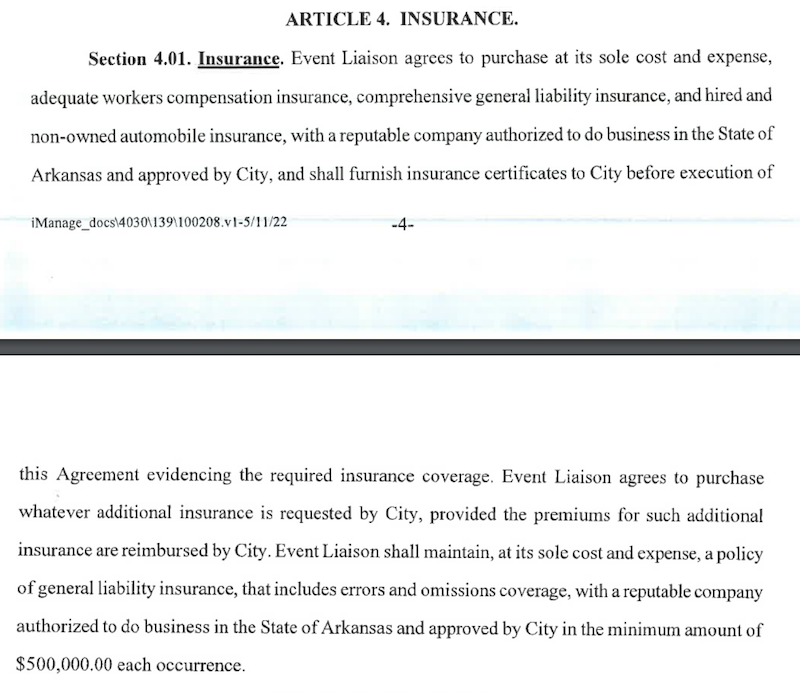
Think Rubix was required to obtain insurance from a company approved by the city and “furnish insurance certificates to City before execution of this Agreement.” I requested these certificates from the city yesterday, and they should be readily available considering they had to be turned in prior to June 9, but no documents have been produced thus far. We’ll have to circle back around to this part later, I suppose.
Moving on…
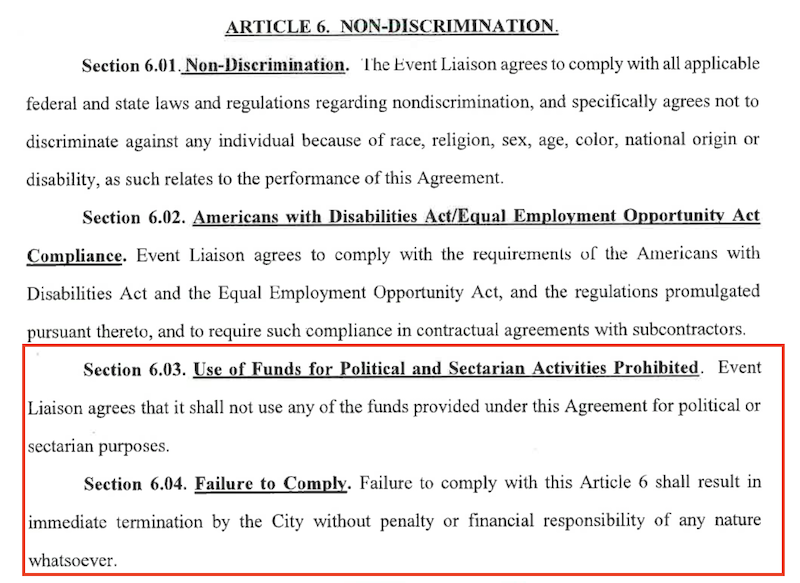
Pretty straightforward. Don’t use the money–or, by logical extension, the festival–for any political or religious purposes. Makes sense, considering these are city funds, right?
Well, I’m not saying that Think Rubix (formerly a paid consultant in Frank Scott’s mayoral race and employer of at least one person who gave thousands of dollars to Scott’s campaign) isn’t going to abide by this term, but…it’s not starting out great.

I am going to save a dive into Think Rubix’s response to the city’s RFQ for another time, as this has gone on long enough. So let’s wrap this one up with a final page of the contract. Is this just an example of the kind of poor contact drafting you get when there are no lawyers involved in the process?
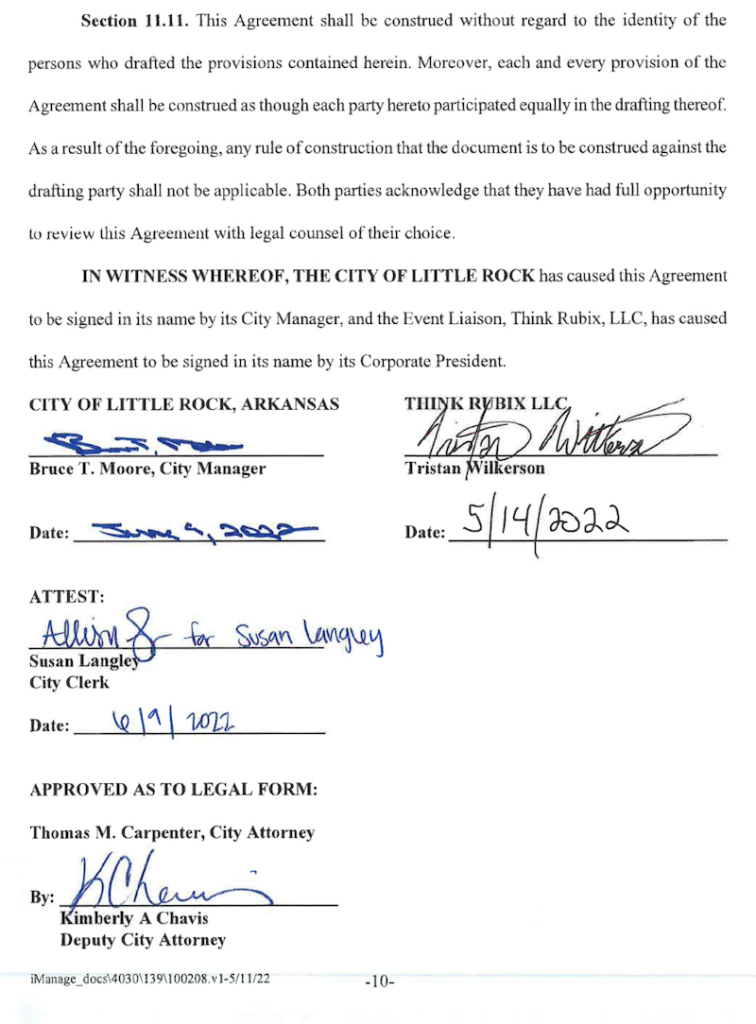
Nope! All of the parties certified that they had the opportunity to discuss the agreement with counsel. More to the point, City Attorney Tom Carpenter’s Office read this agreement and literally signed off on it!
Look, it’s one thing if a bunch of non-lawyers try to draft a contract and manage to bungle some things because they didn’t know any better. It is quite another when the city attorney signs off on something this absurd. And it doesn’t matter that Kimberly Chavis signed, rather than Tom Carpenter; Carpenter is the city attorney, and it’s his name on the contract. If he gave his deputy city attorneys authority to sign off on city contracts, then all of this rolls downhill to him, regardless of who signed for him.
I could go on and on, but I won’t. Ultimately, what we have here is a shady process used to award a terribly drafted contract to a vendor who has done next to nothing since winning that contract. And, rather than just admit that their hand-picked vendor has completely dropped the ball, they have chosen to pretend like everything is fine and that anyone who dares point out that the emperor is naked is only doing so for racist or political reasons.
They can be opaque as always and tell whatever lies they want. But no number of inane tweets about brunch or concerts is going to change the fact that the only thing “lit” about this Hindenburgian undertaking is $45,000 in taxpayer funds going up in flames to fund an ego-fluffing event for an insecure mayor.
***
If you like what we are doing here and find Blue Hog Report to be a valuable part of Arkansas politics, please consider subscribing to our Patreon page.